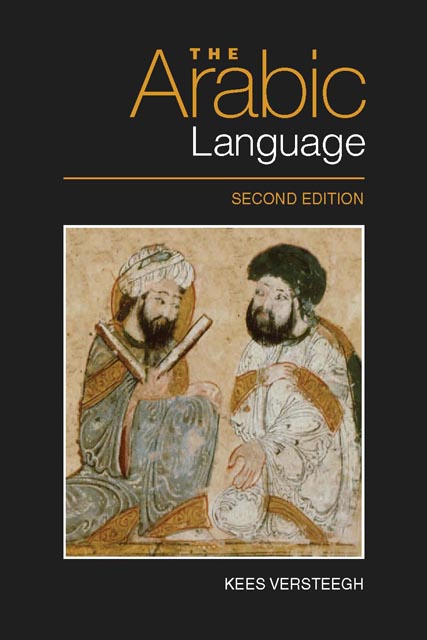Book contents
- Frontmatter
- Contents
- Preface to First Edition
- Preface to Second Edition
- List of Figures and Maps
- List of Tables
- Note on Transcription and Glossing
- 1 The Study of Arabic in the West
- 2 Arabic as a Semitic Language
- 3 The Earliest Stages of Arabic
- 4 Arabic in the Pre-Islamic Period
- 5 The Development of Classical Arabic
- 6 The Structure of Arabic
- 7 The Arabic Linguistic Tradition
- 8 The Emergence of New Arabic
- 9 Middle Arabic
- 10 The Study of the Arabic Dialects
- 11 The Dialects of Arabic
- 12 The Emergence of Modern Standard Arabic
- 13 Diglossia
- 14 Bilingualism
- 15 Arabic as a Minority Language
- 16 Arabic Pidgins and Creoles
- 17 Arabic as a World Language
- Bibliography
- List of Abbreviations
- Index
- Frontmatter
- Contents
- Preface to First Edition
- Preface to Second Edition
- List of Figures and Maps
- List of Tables
- Note on Transcription and Glossing
- 1 The Study of Arabic in the West
- 2 Arabic as a Semitic Language
- 3 The Earliest Stages of Arabic
- 4 Arabic in the Pre-Islamic Period
- 5 The Development of Classical Arabic
- 6 The Structure of Arabic
- 7 The Arabic Linguistic Tradition
- 8 The Emergence of New Arabic
- 9 Middle Arabic
- 10 The Study of the Arabic Dialects
- 11 The Dialects of Arabic
- 12 The Emergence of Modern Standard Arabic
- 13 Diglossia
- 14 Bilingualism
- 15 Arabic as a Minority Language
- 16 Arabic Pidgins and Creoles
- 17 Arabic as a World Language
- Bibliography
- List of Abbreviations
- Index
Summary
The nature of diglossia
In written Arabic, the choice between the standard normand the colloquial language at first sight appearsto be relatively uncomplicated: in writing, StandardArabic is always used. But even here, problems ofselection may arise. One complication derives fromthe fact that many people possess only a limitedknowledge of the standard norm. For these people,Standard Arabic remains the target, but in writingit they make many mistakes. This results in theso-called Middle Arabic texts that have beendiscussed above (Chapter 9). A further complicationmay arise when, for ideological or literary reasons,writers decide to compose their literary writings inan approximate version of the colloquial language.Even these authors usually mix their colloquiallanguage with elements from the standardlanguage.
In spoken Arabic, the situation is far morecomplicated. Perhaps the best analogue to thesituation in the Arabic-speaking countries would bethat of a hypothetical modern France, where allnewspapers and books are written in Latin, speechesin parliament are held in Latin, and in churches theonly language used by the priests is Latin. On theother hand, people talking in a cafe use French,people at home or among friends use French. Inschool, the official language of the classroom isLatin, but during the breaks between classesstudents use French among themselves, and so do theteachers. We know, of course, that the situation inFrance is not like this; but things could have beendifferent, had the standard norm not switched fromLatin to vernacular French in the fifteenth andsixteenth centuries.
In Arabic-speaking countries, the actual situation isvery much like the hypothetical situation sketchedhere for France. At first sight, there appear to betwo varieties of the language, the Classicalstandard, usually called fuṣḥā, and the colloquial language,usually called ʿāmmiyya or (in North Africa) dārija, and in Westernpublications, ‘dialect’ or ‘vernacular’. These twovarieties divide among themselves the domains ofspeaking and writing: the standard language is usedfor written speech and for formal spoken speech,whereas the colloquial language is used for informalspeech.
- Type
- Chapter
- Information
- The Arabic Language , pp. 241 - 258Publisher: Edinburgh University PressPrint publication year: 2014



